Devadaru – Cedrus deodara Uses, Research, Side Effects
Himalayan Cedar – Cedrus deodara is extremely useful in neurological disorders, asthma, pruritus, fever, infested wounds. Deodar oil is also used in arthritis, headache etc.
Botanical Name – Cedrus deodara (Roxb) Loud.
Family- Pinaceae (Sarala Kula)
Table of Contents
Vernacular names
Names in different languages:
Hindi Name- Devadara, Devdara, Devdaru
English Name- Himalayan Cedar, Deodar Trees
Telugu Name- Devadaru
Tamil Name – Devadaram
Bengali Name- Beyar
Marathi & Gujarati Name – Devadar
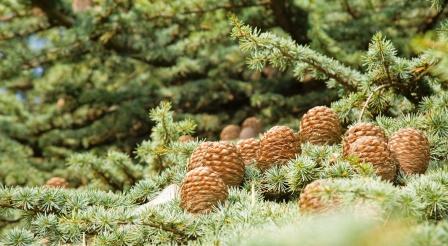
Sanskrit Synonyms
Indradaru, Devakashta, Devdaru – Grows in the place of Gods – Himalayas
Suradaru, Surahva, Sura Kashta, Sura Bhuruha, Suradruma – Grows in the place of Gods – Himalayas
Shakradru, Drukilinam, Amaradaru, Kilima
Bhadradaru – Word of Devadaru is very strong
Drukalima – On injury stem exudates sugar
Putikashta – Wood has pleasant strong odour
Bhadrakashta, Snehaviddha
Pitadru – Yellow coloured wood
shakrapadapa – Liked by Lord Indra
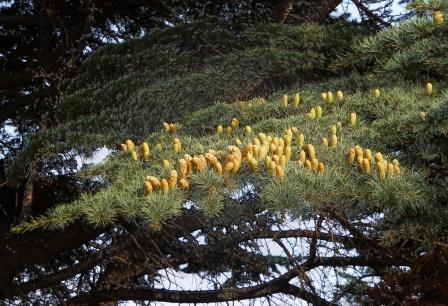
Classical categorisation
Charaka-
Stanya Shodhana – Group of herbs used in cleansing breast milk,
Anuvasanopaga – Group of herbs used in Oil enema – Anvasana Basti Panchakarma treatment
Katuka skandha
Sushruta-
Vata Samshamana – Group of herbs useful in balancing Vata Dosha.
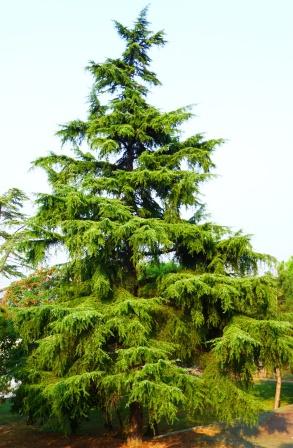
Varieties
There is two varieties according to Raja Nighantu
Devadaru – Cedrus deodara
Sarala Devadaru – Pinus Longifolia Roxb.
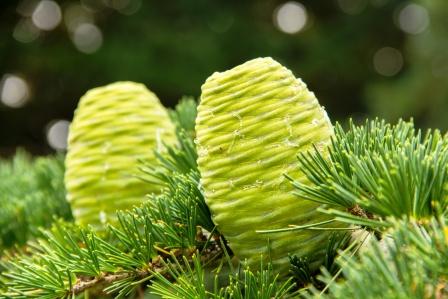
Distribution
Found in north-west Himalayas from Kashmir to Mussoorie -From 3500 – 1200 square feet height.
Morphology
Bark – Dark, rough on old stems sometimes furrowed
Shoots – Long shoot with the needles solitary and arranged spirally
Leaves – needle like, sharp pointed
Flowers – Monoecious Female flowers solitary at the ends of branchlets
Fruits – Cone like erect
Seed – pale brown, wing longer than the seed
Chemical constituents
Essential oil from wood; P- methylacetophenone, atlantone, Sesquiterpenes (a&b – Himochalene , Himachalol etc) stem bark; decoction , Toxifilin.
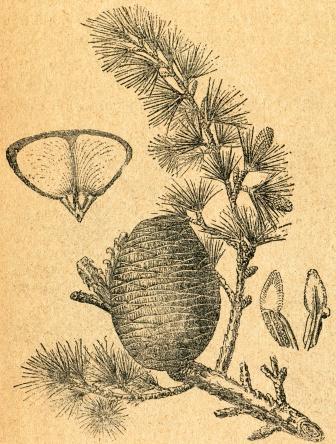
Medicinal properties
Deodar – Medicinal Properties:
Rasav (taste) – Tikta (Bitter), Katu (pungent), Kashaya (Astringent)
Guna (qualities) – Rooksha (Dryness), Laghu (Lightness)
Vipaka- Katu – Undergoes pungent taste conversion after digestion
Veerya – Ushna – Hot potency
Effect on Tridosha :
Balances Kapha and Vata Dosha.
Part used, dosage
Part Used- Deodar Bark, Heartwood, Himalayan Cedar oil, leaves, resin
Dosage:
Bark powder 1-5 g;
Kashaya – Decoction – 50-100 ml; in divided doses per day.
Oil- 30 to 40 drops.
Sanskrit verse
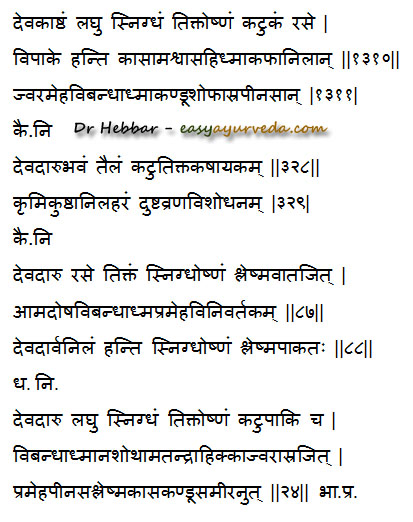
Sushruta Sutrasthana 45
Dushtavrana Shodhana – cleanses infested wounds
Krumihara – useful in worm infestation, infected wounds
Kaphahara – balances Kapha, useful in productive cough, asthma
Kushtahara – useful in skin diseases
Anilahara – Balances Vata, useful in neurological conditions
Kasahara – useful in cough and cold
Amahara – Relieves ama – a product of indigestion and altered metabolism.
Shwasahara – useful in treatment of asthma and chronic respiratory disorders.
Hidhmahara – relieves hiccups
Jwarahara – useful in fever
Mehaghna – useful in urinary tract disorders and diabetes
Vibandhahara – Relieves constipation
Adhmanahara – relieves bloating, gaseous distension of abdomen
Kandughna – useful in relieving pruritus (excessive itching)
Shophahara – relieves swelling, oedema, anti inflammatory
Asrajit – useful in blood disorders such as abscess, bleeding disorders, vascular disorders etc.
Peenasahara – useful in running nose, sinusitis
Amahara – Relieves ama – a product of indigestion and altered metabolism.
Pramehahara – Useful in diabetes
Hikkahara – relieves hiccups
Kanduhara – useful in relieving pruritus (excessive itching)
It is used in treating obesity.
Devadaru oil benefits
Deodar oil is
Katu – pungent, Tikta – Bitter and Kashaya – astringent in taste
Krumihara – useful in worm infestation, infected wounds
Kushtahara – useful in skin diseases
Anilahara – useful in treating disorders of Vata Dosha imbalance such as neuralgia, paralysis, constipation, bloating, etc
Dushtavrana Shodhana – cleanses infected wounds
Oil is useful externally and orally for treating syphilis.
External application
External application of paste of Deodar helps to relieve pain, swelling, inflammation, cleansing infected wounds, and in skin disorders associated with pain and itching.
Himalayan Cedar oil is also used in headache, arthritis pain and in infested wounds, externally.
Its paste is applied externally to relieve breast pain, mastitis.
Ashtanga Hrudaya mentions usage of Devadaru as an ingredient in upanaha Sweda is application of poultice in sweating treatment, to relieve stiffness as in rheumatoid arthritis and cervical spondylosis.
Charaka Samhita mentions this as an ingredient of powder massage powder (Udvartana) – useful in treating obesity, pruritus, urticaria etc.
Charaka also mentions this as an ingredient in preparing cream to be applied during winter to relieve pain and body stiffness.
Research
Analgesic and anti inflammatory activity
Against gastric ulcer
Anxiolytic and anticonvulsant activity of alcoholic extract
Anti ulcer and anti fungal effect
Side effects
There are no known side effects with this herb.
Can be used safely during lactation period and in children.
Seek medical advice for usage during pregnancy.
The pollen of Cedrus deodara is a proven allergen and can cause allergic rhinitis or hives on exposure. (research)
Interaction with medicines, supplements
Can this be used while taking Homeopathic medicine?
Yes. This product does not react with homeopathic medicine.
Can this medicine be continued while taking supplements like multivitamin tablets, Omega 3 fatty acids etc?
Yes. Generally, this product goes well with most dietary supplements. However, if you are taking more than one product per day, please consult your doctor for an opinion.
With western
medicines
Seek your
doctor’s advice if you are taking this product along with other western
(allopathic / modern) medicines. Some Ayurvedic herbs can interact with modern
medicine.
If both Ayurvedic and allopathic medicines are advised together, then it is
best to take Allopathic medicine first, wait for 30 minutes and then take the
Ayurvedic medicine.
Ayurvedic medicines
Ayurvedic medicines with Cedrus deodara ingredient:
Devdarvadi Kashaya – used in the treatment of cough, cold, bronchitis, asthma, bodyache etc.
Chandraprabha Vati – used in diabetes, diseases of urinary tract.
Maharasnadi Kashayam – used in Vata disorders like Kampavata (Parkinson’s disease), hemiplegia, paraplegia, Neck pain, low back pain, etc
Pushkaramoolasav – used in treating Chronic Obstructive Pulmonary Disorder, Bronchitis etc.
Anu Oil – used in the treatment of diseases of the above sense organs.
How to use it?
Its powder or paste or Devadaru oil is applied externally for the said conditions.
Its powder or Kashayam is prepared by adding a tablespoon of Devadaru heartwood to two cups of water, boiled and reduced to half a cup and filtered, administered in lukewarm condition.
Devadaru oil is used as an ingredient in pain relief oils and liniment. It acts as a rubefacient. Eg: Bestlin Liniment
Sthanika karma (Systemic Acton)
Externally – Reduce pain and swelling, cleanses the wound, promotes wound healing. indicated in skin disorders, has antimicrobial properties. Oil is indicated in fractures, joint diseases, wounds etc.
Internally
Nervous system – Indicated in Osteoarthritis, Rheumatic joint disease,sciatica,headache etc
Digestive system – It is carminative, digestive. Indicated in abdominal bloating, constipation, helminthiasis
Circulatory System – Being ushna virya stimulates the heart. bitter taste helps to purify blood and reduce swelling. Indicated in blood borne diseases, lymphadenitis, filariasis.
Respiratory System –Its bitter and unctuous qualities helps to eliminate excess kapha. Indicated in kasa (Cough) and running nose, hiccough
Excretory system – Helps to increase urine production. Its bitter taste helps to reduce sugar level in diabetes patients, Indicated in painful urination, UTI.
Reproductive System – Purifies breast milk, cleanses uterus so indicated in puerperal diseases.
Satmikarana – Indicated in obesity
Skin – Beneficial in skin diseases
Tapakrama – Indicated in Jirna jvara (Chronic fever)











16 comments
Ronald
I have heard cedarwood oil has sedative effects, is this also true with Devadaru?
Any links with the name C. deodara and deodorant?
Dr J V Hebbar MD(Ayu)Author
You can use it till pregnancy is confirmed. But I do not see any need of it, during pregnancy.
SANA
PLZ i need the refernce of this article.
Dr J V Hebbar MD(Ayu)Author
Bhavaprakasha and rest of the nighantu.
rushi333
It can eat during fast?
Parul
Can Deodar oil use as cooking oil
Dr J V Hebbar MD(Ayu)Author
No.
Laks
Hi, Can Devadaru oil be used for Ear problems? If so, in general how much to use and what is the frequency? Thanks..
Dr J V Hebbar MD(Ayu)Author
I have not read about its usage in ear problems.
Elsa
Hi, what oils work well for ears? Can Mullein oil work well, or canabis oil? What about clove oil and peppermint oil?
Dr J V Hebbar MD(Ayu)Author
Depends on the ear disease.
For earache basil, rosemary, tea tree, olive, oregano, thyme, peppermint, garlic, lavender, and mustard oils are useful.
Jyotibass
Can male adults use tea of bark regularly like normal tea
Rajalakshmi.s
Hi can cure leg or feet inching
Dr J V Hebbar MD(Ayu)Author
Yes.
C R Venkateswaran
Is Cedrus deodara oil is massaged for itching ?
Dr J V Hebbar MD(Ayu)Author
Yes.